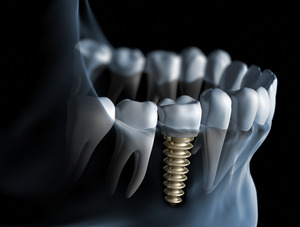
Dental implants represent a significant investment, and they can make a big difference in your ability to eat a variety of foods and smile with confidence. As such, you’ll naturally want to do everything you can to protect them. It is rare for dental implants to fail, but you need to be aware of the possibility so that you can take the right steps to avoid it. Below is an overview of what can cause dental implant failure and how it can be prevented.
What Can Lead to Dental Implant Failure?
Dental implants are known for their ability to last for decades, and they have a success rate of around 95%. Nevertheless, there are a number of factors that can cause them to fail.
One of the biggest possible threats to your dental implants is peri-implantitis. This is an infection that occurs around the implant post, damaging the gums as well as the underlying bone. If the infection remains untreated, the tissues in the area will start to deteriorate, causing the implant post to come loose.
There’s also the possibility of failed osseointegration to consider. Osseointegration is the term for a natural process where the implant post fuses with the bone around it. In some cases, osseointegration doesn’t take place as intended, which results in the implant posts becoming unstable.
How Can Dental Implant Failure Be Avoided?
Your periodontist will take a number of steps to minimize the chances of dental implants failing, such as ensuring that there’s plenty of bone for successful osseointegration. Once the implant posts have been inserted into your jaw, it will be up to you to take care of them and make sure that the tissues around them remain healthy. Here are some of the steps you’ll need to follow:
- Practice good oral hygiene to reduce the chances of peri-implantitis. In addition to brushing twice a day, you should also get in the habit of flossing in order to clean the hard-to-reach areas between the teeth.
- Be mindful of what you eat. Limit your consumption of sugary foods that can contribute to oral health problems.
- Avoid smoking until osseointegration is complete. Smoking can inhibit the body’s healing processes, thereby increasing the chances of dental implants failing.
- Visit your regular dentist every two months for a checkup. They can evaluate the state of your dental implants and let you know if any problems are developing.
Taking the right precautions to avoid dental implant failure could make all the difference for the success of your newly restored smile. Be sure to let your periodontist know if you have any concerns about the state of your dental implants.
About the Author
Dr. David Handsman is a Diplomate of the American Board of Periodontology and holds membership with the Massachusetts Periodontal Society. He has helped many individuals re-complete their smiles with sturdy, comfortable dental implants. If you would like to schedule a consultation with Dr. Handsman at Handsman & Haddad Periodontics in Worcester, visit his website or call (508) 753-5444.

